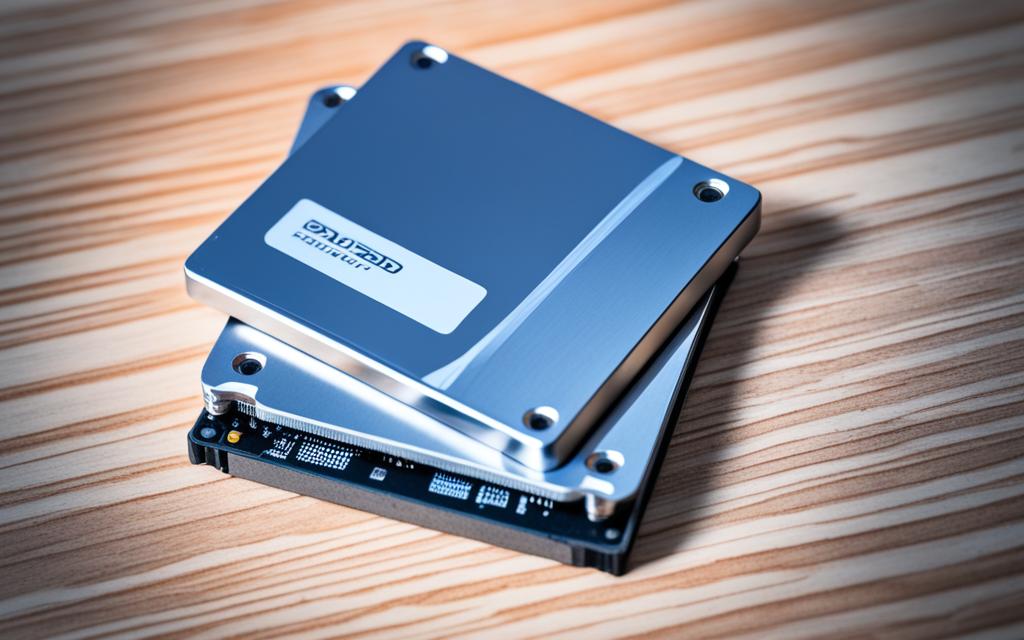Table of Contents
In the world of data storage, Solid State Drives (SSDs) are becoming more popular than Hard Disk Drives (HDDs). Their high performance and reliability make them stand out. SSDs don’t have moving parts, making them more stable and less likely to get damaged by drops or bumps. This article will explain why SSDs are so stable. It will look at their benefits over HDDs and what makes them last longer. Whether you’re an individual or an organisation, knowing this can help you choose the best storage. For more on the differences between SSDs and HDDs, check out this link1.
Key Takeaways
- SSDs outperform HDDs in speed, accessing data instantly.
- Without mechanical parts, SSDs are more durable and stable.
- While HDDs may hold more data, SSDs are quickly catching up.
- SSDs are better for saving energy and last longer in performance.
- Choosing data storage should be based on performance, durability, and how it will be used.
Understanding the Basics of SSDs and HDDs
Data storage technology presents different solutions, with SSDs and HDDs standing as popular options. It’s vital to understand how they differ to boost data management. We’ll look at the definitions of SSDs and HDDs and highlight key differences through a comparison.
What is an SSD?
SSDs, or Solid State Drives, use flash memory for storing data, which allows quick access. This means you can move a 20 GB movie in less than 10 seconds2. In contrast, HDDs need over two minutes for the same job. SATA SSDs transfer files at about 500 MB/s, while NVMe SSDs can hit speeds up to 3,500 MB/s2. This shows SSDs’ significant speed advantage over HDDs.
What is an HDD?
HDDs, or Hard Disk Drives, have been around for more than 50 years and use spinning parts to read data. They spin at 4200 to 7200 rpm in most computers3. Despite offering more storage, HDDs are slower and more at risk of damage from their moving pieces.
Key Differences Between SSDs and HDDs
SSDs and HDDs differ significantly. From speed and durability to energy use and cost, each has unique advantages and disadvantages. SSDs boot Windows in roughly 10 seconds and tend to last over five years under good conditions2. They’re also more energy-efficient and generate less heat3. On the other hand, HDDs might cost less initially but suffer from their mechanical design.
The Mechanisms Behind Stability
Data storage devices must be built well to last long. Solid-state drives (SSDs) are known for having no moving parts. This feature is key to their mechanical stability. On the other hand, hard disk drives (HDDs) rely on mechanical components. These parts can lead to HDD problems, affecting how reliable they are for storing data.
No Moving Parts in SSDs
SSDs use solid-state parts and don’t have anything that moves. This means they work faster and are more reliable. Because there are no moving parts, SSDs can handle bumps and drops better. They are ideal for portable devices where keeping data safe is crucial. SSDs are suited for tasks that need speed and endurance. They can manage lots of reading and writing of data, which is great for demanding work.
Impact of Mechanical Components in HDDs
HDDs have parts like spinning disks and arms that read/write, which can be weak spots. Wear and tear on these parts can cause loss or damage to data. HDD problems like crashes happen if there’s a knock or extreme temperatures. This puts HDDs at a disadvantage for those who need to keep their data safe. Their slower speed, compared to SSDs, makes many choose SSDs for better data handling in our digital world.
| Aspect | SSDs | HDDs |
|---|---|---|
| Mechanical Components | No moving parts | Spinning platters and moving heads |
| Speed | Faster access and read times | Slower due to mechanical operation |
| Shock Resistance | Highly shock-resistant | Susceptible to damage |
| Data Reliability | Greater stability | Vulnerable to mechanical failure |
SSDs clearly outshine HDDs in terms of mechanical stability and keeping data safe. SSD technology is quickly advancing. It’s becoming the top choice for modern computing needs45.
Why is an SSD More Stable Than an HDD
People now prefer SSDs over HDDs for many reasons, making them more stable. SSDs stand out thanks to their great shock resistance, better handling of heat, and ability to withstand rough environments. They are perfect for lots of different uses.
Dropping and Shock Resistance
SSDs are much better at handling shocks because they don’t have moving parts. Instead of fragile mechanics, SSDs use flash memory. This means they can survive drops from nearly 2 meters. Rugged SSDs show how well they can handle rough situations6. Their sturdiness makes businesses and individual users feel confident in them, particularly when moving around is part of the job.
Heat and Power Efficiency
SSDs also beat HDDs in how they manage heat. With no moving parts, SSDs stay cooler, leading to less heat in use. This keeps SSDs working well even when used a lot. They also use less energy, making them a greener option7.
Durability Against Environmental Factors
When it comes to lasting in tough environments, SSDs shine. They’re tough against wet conditions, temperature changes, and magnetic fields. All these can make HDDs less reliable. Even though HDDs can store up to 28TB6, SSDs keep performing well no matter the environment. This reliability is crucial for keeping data safe in unpredictable conditions.
To wrap it up, SSDs offer better durability, heat management, and shock resistance than HDDs. This makes them the top choice for stable data storage67.
Reliability Factors of SSDs
It’s important to understand how reliable Solid-State Drives (SSDs) are for long-term storage. Several key factors help us know how well SSDs perform. These include Program/Erase (P/E) cycles, Terabytes Written (TBW), and Mean Time Between Failures (MTBF). Compared to Hard Disk Drives (HDDs), SSDs last longer and are more dependable.
P/E Cycles and Lifespan
The number of P/E cycles tells us how long an SSD can last. They can range from 500 to 100,000 cycles8. The type of NAND flash memory affects this range. SLC, MLC, TLC, and QLC have different endurance levels8. New technologies like 3D NAND are making SSDs more dense and fast, without lowering their lifespan.
Terabytes Written (TBW) and Mean Time Between Failures (MTBF)
TBW shows how much data you can write to an SSD before it fails. For instance, the Samsung V-NAND SSD 870 EVO offers TBWs from 150 for a 250GB model, up to 2,400 for a 4TB model8. Also, SSDs last much longer than HDDs, with MTBFs up to 1.5 million hours. This is much better than the 300,000 hours HDDs last8. This difference highlights the robustness and reliability of SSDs, making them great for important tasks.
When choosing storage, knowing these reliability factors helps make a good choice. Despite their higher price, SSDs’ lower failure rates and better performance make them worth the cost in the long run9.
Conclusion
In summary, SSDs hold a big advantage over HDDs in today’s world of storing data. Their solid-state design leads to more stability and better shock resistance. This is key for keeping data safe. Also, SSDs have a low failure rate of just 0.58% compared to HDDs’ 10.56%. This fact makes SSDs a smarter choice for both technology and peace of mind1011.
SSDs use less power but work faster, which means they save energy. This results in laptops having a longer battery life and desktops running more quietly. Their fast access to data marks them as the better option for those who value both performance and security of their data10.
Moving to SSD technology is a smart step towards a more dependable and efficient use of computers. By choosing the right data storage, people can look forward to advancements in technology that bring better performance. For more information on SSDs, click the link.
FAQ
What advantages do SSDs have over HDDs?
SSDs beat HDDs in many areas. They fetch data faster and last longer because they don’t break easily. Without moving parts, they’re safer from drops or bumps.
How do SSDs achieve stability?
SSDs are solid and don’t wiggle or move inside. This means they can take a hit or shake without getting hurt. They’re better at putting up with rough use than HDDs are.
What are P/E cycles, and why are they important?
P/E cycles count how many times an SSD can be used to store and wipe data. They show how long the SSD will work well. Most new SSDs go from 500 to 100,000 cycles, which is quite impressive.
Can SSDs handle extreme temperatures?
Yes, SSDs work fine in really hot or cold places. Their design keeps them safe in temperatures that would trouble HDDs.
What is MTBF and how does it compare for SSDs and HDDs?
MTBF measures how long a storage device is expected to last. SSDs often reach up to 1.5 million hours. HDDs, however, usually hit around 300,000 hours. This shows SSDs as more reliable.
How do SSDs perform in terms of power efficiency?
SSDs are better with power. They use less electricity, leading to less heat. This saves money and could help the SSD last even longer.
How do SSDs compare with HDDs in terms of cost?
SSDs might cost more initially than HDDs. But, their faster operation, strength, and energy savings mean they might save money in the long run. So, investing in SSDs can be smart.
Are there any disadvantages to using SSDs?
The main downside of SSDs is they’re pricier than HDDs. They also have a limit on how many times they can be rewritten. Still, most people find their benefits worth the extra cost.
Source Links
- https://www.ibm.com/think/topics/hard-disk-drive-vs-solid-state-drive – Hard Disk Drive (HDD) vs. Solid State Drive (SSD) | IBM
- https://www.avast.com/c-ssd-vs-hdd – SSD vs. HDD: Which Do You Need?
- https://www.crucial.com/articles/about-ssd/ssd-vs-hdd – SSD vs HDD: Know the Difference
- https://www.techtarget.com/searchstorage/definition/SSD-solid-state-drive – What is an SSD (Solid-State Drive)?
- https://www.ninjaone.com/blog/ssd-vs-hdd-vs-sshd/ – SSD vs HDD vs SSHD: How to Choose? | NinjaOne
- https://www.westerndigital.com/solutions/ssd-vs-hdd – SSD vs HDD: Gaming, Speed, and Data Transfer | Western Digital
- https://www.pcmag.com/news/ssd-vs-hdd-whats-the-difference – SSD vs. HDD: What’s the Difference?
- https://www.backblaze.com/blog/how-reliable-are-ssds/ – Are Solid State Drives / SSDs More Reliable Than HDDs?
- https://www.zdnet.com/article/are-ssds-more-reliable-than-hdds-this-research-may-have-the-answer/ – Are SSDs more reliable than HDDs? This research may have the answer
- https://www.semshred.com/hdd-vs-ssd-for-data-storage-which-is-better/ – HDD vs. SSD for Data Storage: Which is Better? – SEM Shred
- https://www.redswitches.com/blog/ssd-vs-hdd/ – SSD Vs HDD: A Long-Term Storage Media Comparison








